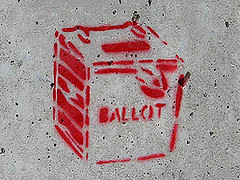Remembering the Orange Revolution
Before the varied attire of Arab Spring protesters, in recent times, revolutions tended to come in colours. Ukraine was awash with orange. Kyrgyzstan chose pink and Georgia rose. Thailand could not make its mind up over red and yellow. Choices varied but in each instance pigmentation signified unity behind certain causes and grievances. Yet in some cases the colours imbued more than solidarity – they bred an artistic renaissance. Last Friday, Olga Onuch, a former DPhil student in the DPIR and now a post-doc at the University of Toronto, and her father, Jerzy Onuch, spoke about the intersection between art and protest. Both know a lot about the topic: it is the subject of Ms. Onuch’s recently completed PhD dissertation …
Did the fax machine cause the Tunisian uprising?
Sounds unlikely. Did Twitter? Nobody really seems to claim so, though Evgeny Morozov erroneously claims that Andrew Sullivan claims so, though Sullivan actually only raised the question and linked to Ethan Zuckerman, who … wait, back to the fax machine. I met Marc Plattner yesterday, who edits the Journal of Democracy and is a veteran of both academic and policy discussions around issues of democracy and democratization. He told me about how some people used to claim the fax machine “caused” (or at least played a large part in) the collapse of the Soviet Union. You can imagine all the arguments that could be marshalled. (“Between them, television, the fax machine and word of mouth have banished fear,” writes John …

One Vote, One Value: More complicated than it sounds
The People’s Charter of 1848 contained six demands, then considered dangerously radical by both Whig and Tory governments. One of the six was: EQUAL CONSTITUENCIES, securing the same amount of representation for the same number of electors, instead of allowing small constituencies to swamp the votes of larger ones. The Chartists might have been surprised to find that it was a Conservative-dominated government which first tried to enact equal representation, in the Parliamentary Voting System and Constituencies Bill 2010 (PVSCB in civil servantese). As I write, the controversial bill has passed the Commons, and is being considered by Their (unelected) Lordships, who have no scruples about amending bills on how to elect another house. Oh well, that’s politics. Some political …
The “Post-Copenhagen Era” and Cancun: an opportunity for the EU and China.
Today there is no agreement on what should replace the Kyoto Protocol (KP) expiring in 2012. What is certain, however, is that the framing of the new climate regime may create new scenarios, involving new fora and strengthening certain international players while weakening others.









